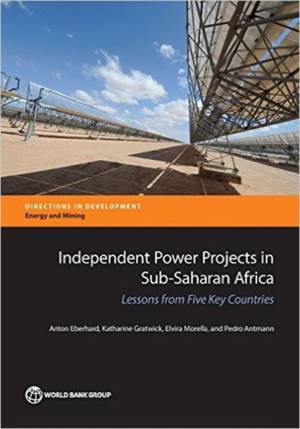
- Retrait gratuit dans votre magasin Club
- 7.000.000 titres dans notre catalogue
- Payer en toute sécurité
- Toujours un magasin près de chez vous
- Retrait gratuit dans votre magasin Club
- 7.000.0000 titres dans notre catalogue
- Payer en toute sécurité
- Toujours un magasin près de chez vous
Independent Power Projects in Sub-Saharan Africa
Lessons from Five Key Countries
Anton Eberhard, Katharine Gratwick, Elvira Morella
55,45 €
+ 110 points
Description
Inadequate electricity services pose a major impediment to reducing extreme poverty and boosting shared prosperity in Sub-Saharan Africa. Simply put, Africa does not have enough power. Despite the abundant low-carbon and low-cost energy resources available to Sub-Saharan Africa, the region s entire installed electricity capacity, at a little over 80 GW, is equivalent to that of the Republic of Korea. Looking ahead, Sub-Saharan Africa will need to ramp-up its power generation capacity substantially. The investment needed to meet this goal largely exceeds African countries already stretched public finances. Increasing private investment is critical to help expand and improve electricity supply. Historically, most private sector finance has been channeled through privately financed independent power projects (IPP), supported by nonrecourse or limited recourse loans, with long-term power purchase agreements with the state utility or another off-taker. Between 1990 and 2014, IPPs have spread across Sub-Saharan Africa and are now present in 17 countries. Currently, there are 125 IPPs, with an overall installed capacity of 10.7 GW and investments of $24.6 billion. However, private investment could be much greater and less concentrated. South Africa alone accounts for 67 IPPs, 4.3 GW of capacity and $14.4 billion of investments; the remaining projects are concentrated in a handful of countries. The objective of this study is to evaluate the experience of IPPs and identify lessons that can help African countries attract more and better private investment. At the core of this analysis is a reflection on whether IPPs have in fact benefited Sub-Saharan Africa, and how they might be improved. The analysis is based primarily on in depth case studies, carried out in five countries, including Kenya, Nigeria, South Africa, Tanzania and Uganda, which not only have the most numerous but also among the most extensive experience with IPPs."
Spécifications
Parties prenantes
- Auteur(s) :
- Editeur:
Contenu
- Nombre de pages :
- 382
- Langue:
- Anglais
- Collection :
Caractéristiques
- EAN:
- 9781464808005
- Date de parution :
- 15-04-16
- Format:
- Livre broché
- Format numérique:
- Trade paperback (VS)
- Dimensions :
- 178 mm x 254 mm
- Poids :
- 662 g

Les avis
Nous publions uniquement les avis qui respectent les conditions requises. Consultez nos conditions pour les avis.






